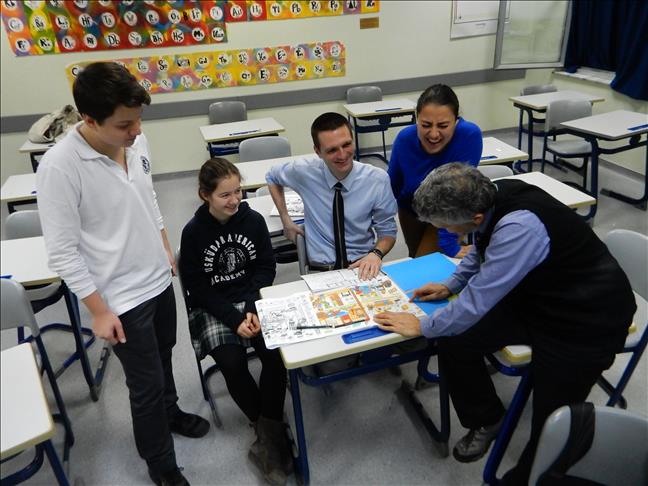
By Handan Kazanci
ISTANBUL
If a Turk, a Cuban, an Armenian and an American were in the same room, which language would they speak to each other? English? Not always.
They could be speaking in Esperanto, an artificial language created at the end of the 19th century by Polish eye doctor and linguist Ludwik Lazarus Zamenhof.
The language’s forgotten story in Turkey includes immigration, a lost history, a desire to promote cultural equality and pioneering Esperantists going on to invent even more progressive forms of communication.
“Esperanto gathers very different people from different cultures on different occasions,” says one Turkish Esperantist, a 19-year-old international relations and sociology student at Istanbul’s Koc University called Selcuk Mert Koseoglu.
The name Esperanto comes from Zamenhof’s penname when he published the first book about the new language – “Unua Libro” – in 1887.
The word “Esperanto” translates as “one who hopes.”
The constructed language, based mainly on European tongues such as Italian, French, German and Russian, was born as a result of Zamenhof’s aim to promote world peace through universal communication.
Today fluent in Esperanto, Koseoglu came across the language by reading a newspaper article when he was 13 years old. He learned the language on his own online.
“Since it is a really simple language with straightforward grammar rules, it didn't take me a lot of time to comprehend the basic structure,” he says.
Learning Esperanto even led him to create his own made-up language "Olesi" – which he presented to various linguists when he was just 15 years old.
Koseoglu didn’t know any other Esperantists in Turkey until 50-year-old chemistry and Esperanto teacher Murat Ozdizdar made contact with him in 2009.
A prominent Esperantist who also teaches the language for free, Ozdizdar’s path to learning Esperanto was just a “coincidence.”
He went to a youth camp in 1984 in Hungary and instead of an English course he ended up learning Esperanto. As a result of mastering this unusual language he has travelled more than 40 countries, staying and communicating with Esperantists.
Esperanto speakers have an organization called “Pasporta Servo” (Passport Service) that allows them to stay in each other’s homes for free.
According to Ozdizdar there are only around 50 Esperantists in Turkey. The first were Bulgarian immigrants who came to the country during the 1930s, he says.
“Hayrettin Dural, a retired colonel, was the head of Turkey’s Esperanto Association. After his death the association lost its function and as far as I know all documents about Turkey’s Esperanto history were thrown away,” he adds.
According to the Universal Esperanto Association, which was established in 1908, the organization has around 20,000 members in 120 countries.
The association “stimulates discussion of the world language problem and calls attention to the necessity for equality among languages.”
Today an estimated 100,000 to 2 million people around the world can speak or have knowledge of Esperanto. They have their own flag and anthem as well as a representative under UNESCO.
According to Koseoglu, Esperanto is the most successful constructed language in the world.
“It is relatively easy to learn and its community worked a lot to spread the word, resulting in a lot of fluent and even native speakers,” says Koseoglu who also speaks English, German, Swedish, Spanish and translates from Latin and ancient Greek.
Istanbul Greek Vasil Kadifeli is a new learner of Esperanto.
The 55-year-old computer programmer’s enthusiasm started three years ago when he saw one of his friends comment in the language on social media.
Since then Kadifeli and his wife have devoted themselves to the language and even traveled to Georgia last year to attend an Esperanto convention to improve their language skills.
According to Kadifeli, the main importance of Esperanto is that it gives equal rights to people to express themselves in a language other than English.
“If you are a native speaker in English you can express your ideas fluently at any international meeting but if you are not, you have to spend a lot of time and effort to learn the language,” he adds.
It is possible to trace Esperanto in popular culture as well. There are books, films, newspapers and translations of popular books to Esperanto around the world.
In 2009 Tugce Madayanti shot Turkey’s first Esperanto short-film "Senmova" [Stationary] which tells the tale of two childhood friends living in a dystopian, Esperanto-speaking world.
According to Koseoglu, because natural languages are central to peoples’ cultures, Esperanto was not successful on realizing its aim of becoming a universal language.
“There is something people have to realize: Esperanto is not a nation’s or a state’s language, in contrast to all of the natural languages, including English,” he says.
Koseoglu tells the story of a couple from America – who met in an Esperanto convention club – who told him that they were going to raise their children bilingual, one language being English and the other Esperanto.
“Actually, the way these people talked and lived made me think of Esperanto as not only a language but also a peaceful universal ideology,” he says.
Anadolu Agency website contains only a portion of the news stories offered to subscribers in the AA News Broadcasting System (HAS), and in summarized form. Please contact us for subscription options.

